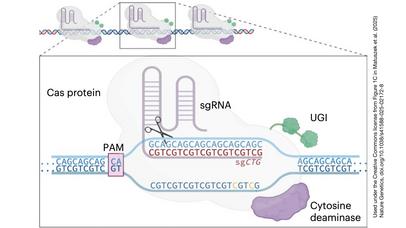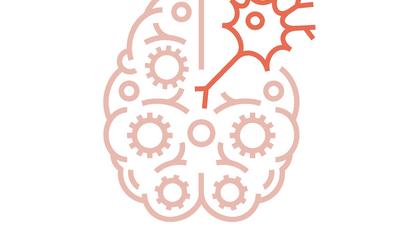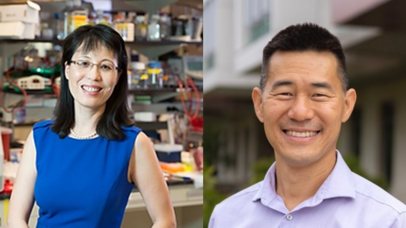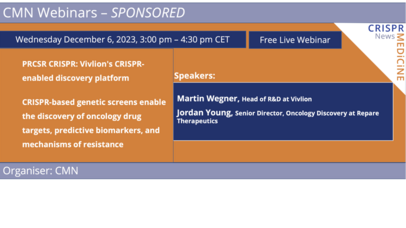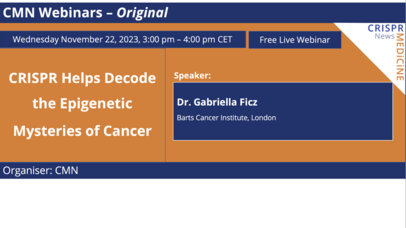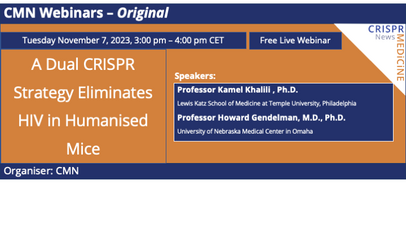CRISPR/Cas13d-Mediated Mutant Huntingtin Elimination: A Promising Therapeutic Strategy for Huntington’s Disease | Wednesday May 17, 2023 | 3:00 pm–4:00 pm CEST / 9:00 am–10:00 am EDT
On-demand webinar is available - Follow this link
CRISPR/Cas13d-Mediated Mutant Huntingtin Elimination: A Promising Therapeutic Strategy for Huntington’s Disease
Huntington’s disease (HD) is a late-onset, fatal neurodegenerative disorder with no cure; currently available treatments merely provide modest relief of symptoms. HD is caused by a gain-of-function mutation: a trinucleotide repeat hyperexpansion in the first intron of the HTT gene, which codes for the Huntingtin protein.
Spearheaded by collaborators Dr. Wenzhen Duan, Professor of Psychiatry and Behavioural Science at Johns Hopkins University School of Medicine, and Dr. Gene Yeo, Professor of Cellular and Molecular Medicine at the University of California San Diego, a recent proof-of-concept study demonstrated that HD phenotypes can be rescued in patient cells and an in vivo mouse model of HD. Their recent Nature Neuroscience publication describes the use of Cas13d to deplete the mutant mRNA transcripts that contribute to the pathogenesis of HD. Experiments in mice showed substantial benefit of the therapeutic approach, including significantly improved motor function.
While therapies targeting mRNA transcripts are typically expected to have only short-term effects, Duan, an expert in HD and other neurodegenerative disorders, explains that their results appear to have real staying power:
»A single injection of the therapy in mice shows rescue of the disease phenotype for at least eight months.«
What will you learn from this webinar:
Current therapeutic development for Huntington's disease
Advantages of CRISPR/13d as a therapeutic agent
Potential of mutant huntingtin-targeting CRISPR/Cas13d for treating Huntington's disease
Webinar Programme:
- 15.00 Welcome and introduction by CRISPR Medicine News
- 15.05 Professor Wenzhen Duan M.D., Ph.D., M.S.|CRISPR/Cas13d-Mediated Mutant Huntingtin Elimination: A Promising Therapeutic Strategy for Huntington’s Disease
- 15.45 Q & A with Professor Wenzhen Duan M.D., Ph.D., M.S.
- 16.00 Close by CRISPR Medicine News
Speaker | Title:
Professor Wenzhen Duan M.D., Ph.D., M.S., Johns Hopkins University School of Medicine, Baltimore, U.S. | CRISPR/Cas13d-Mediated Mutant Huntingtin Elimination: A Promising Therapeutic Strategy for Huntington’s Disease
Speakers
Wenzhen Duan M.D., Ph.D., M.S., Professor at Johns Hopkins University School of Medicine, Baltimore, U.S.

Wenzhen Duan is a Professor of Psychiatry and Neuroscience at the Johns Hopkins University School of Medicine. She received her M.D and Ph.D. in Peking Union Medical College in China and completed postdoctoral training with Dr. Mark P. Mattson in University of Kentucky and National Institute of Aging. She is the founding director of the Translational Neurobiology Research Laboratory at the Johns Hopkins School of Medicine. Her research centers on understanding the cellular and molecular mechanisms underlying neurodegeneration with a focus on developing novel therapeutic strategies and human translatable biomarkers for Huntington’s disease (HD). Her lab has identified novel therapeutic targets and promising small molecule agents for treating HD. Her pioneering work in using non-invasive neuroimaging biomarkers in pre-clinical studies has begun to facilitate the design of human clinical trials. Her recent research, by incorporating an advanced MRI technique and huntingtin-lowering gene therapy in pre-clinical studies, demonstrates that introducing mutant huntingtin-lowering gene therapy in the premanifest period delays the onset and slows disease progression in HD mouse models. This work further emphasises the advantage of early intervention and illustrates that advanced neuroimaging biomarkers are promising to guide HD clinical trials.
Read our CMN interview with Professor Wenzhen Duan here.
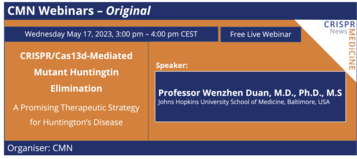
CMN Articles - Huntington's Disease
